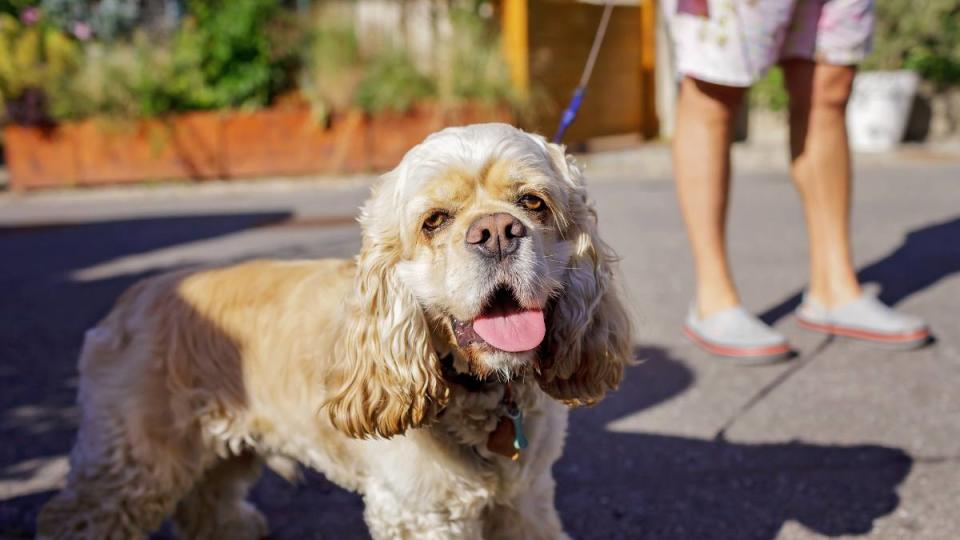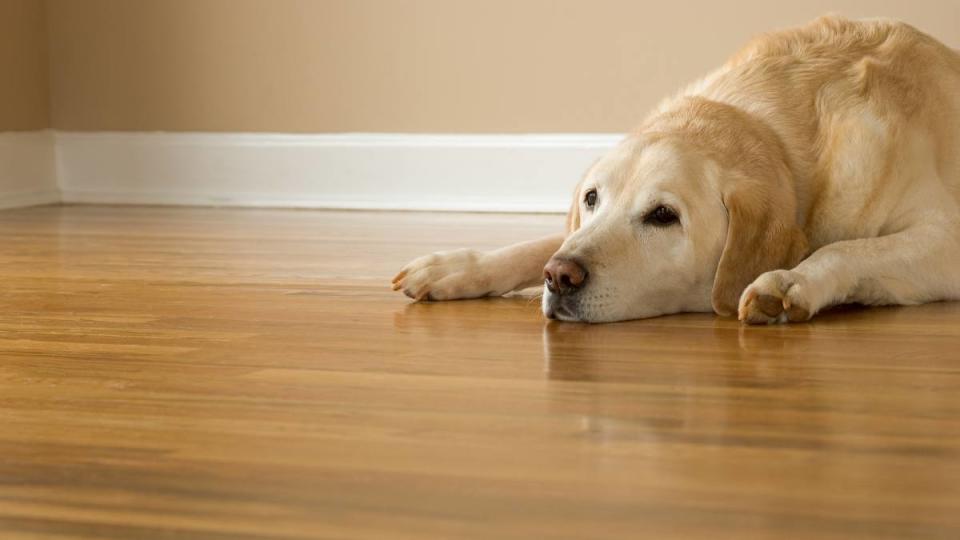Why Is My Dog Panting So Much? Vet Weighs in and Offers Genius Solutions
Romping through sunny afternoons is great fun with your favorite pooch, but you might notice she seems to pant more often in the summertime — in fact, the hotter it gets, the more you notice her panting. Of course, while you may already know some panting is normal, you still might wonder, ‘Why is my dog panting so much?’ “Dogs tend to pant more in the summer,” says Mathieu Glassman, MBA, VMD, DACVS, Founder and CEO of Dr. Cuddles pet products. “The reason is that they need to cool themselves due to higher temperatures and increased humidity.” So while some panting is perfectly normal, and can also occur in many other instances, excessive panting could be cause for concern.
Why is my dog panting so much? 5 main reasons
As it turns out, there are plenty of reasons why your pup might be panting so much. One of the most common is that she is trying to cool down, but surprisingly panting can also be caused by other things such as excitement, anxiety and more. Here, the varied reasons that answer the question, ‘Why is my dog panting so much?’
1. Heat and humidity
As Dr. Glassman mentioned before, dogs pant to cool themselves down when it's hot. This is called thermoregulation. “By moving air quickly through the mouth, cooling occurs through evaporation of saliva and expulsion of warm air from the lungs,” he explains. “In this way panting helps dogs regulate their body temperature since they don't sweat through their skin like humans do.” Instead, dogs sweat through their paw pads.
Related: Why Does My Dog Keep Shaking His Head? Potential Causes and Easy, Effective Fixes
2. Why is my dog panting so much? Exercise
After participating in a strenuous physical activity like a rousing game of fetch, running around the dog park or even a long hike on a warm day, your buddy could get hot. So after lots of exercise your furry friend will also pant to help regulate her body temperature.
3. Excitement
If there’s lots of commotion, like visitors arriving for a BBQ, getting the leash out for a walk or even if you’re offering your buddy a thrilling new toy or treat — lots of panting might ensue. It’s pretty common for dogs to pant when they’re excited. Though this type of panting might be more rapid and shallow than when your sweet pup is panting to regulate her body temperature.
4. Why is my dog panting so much? Stress
Anxiety can also trigger panting. All the whizzes and bangs of Fourth of July fireworks might cause your pal to pant as well as pace, whine or bark. If your sweet girl has separation anxiety she might even display these same behaviors as she follows you around once you put on your shoes or grab your keys. Or perhaps your pup feels intimidated by other dogs. Whatever the reason, if your pal pants at these occasional triggers, as long as you can pinpoint the cause of her anxiety, she most likely won’t need to see a vet. However, if there is no apparent anxiety-inducing incident to set off the panting, you might want to make an appointment to help you figure out what the problem might be.
Related: Why Does My Dog Sleep on His Back? 4 Surprising Reasons, According to Pet Pros
4. Pain and discomfort

“Panting can be a sign of pain or discomfort in dogs,” says Dr. Glassman. As your girl experiences pain, it could lead to anxiety, so if your sweetpea has been injured, she may begin to pant. However, other causes like achy joints or arthritis, a painful tooth or other issues like a UTI might also lead to panting, and these issues might not be so obvious or easy to identify and could require attention from a vet.
5. Medical conditions
In some cases panting might also be an indication of something more serious going on, and warrant a trip to the vet. If panting becomes excessive and is not due to heat, excitement, anxiety etc. it might also occur for one of the following medical reasons:
Neurological disease (like brain tumors affecting temperature regulation)
Heart disease (resulting in poor gas exchange in the lungs and shortness of breath)
Respiratory issues (like lung disease, such as pneumonia)
Cancers (like adrenal tumors secreting adrenaline and raising blood pressure)
Hormonal imbalances (like Cushing's disease, hyperthyroidism)
When panting is a sign of something more serious
So how can you tell if panting is normal or if the answer to ‘Why is my dog panting so much?’ is a real cause for concern? Dr. Glassman says monitoring and observation is key. “Keep an eye on when the panting occurs and any other accompanying behavior or symptoms,” he advises. “Get a video of the panting and keep a log of the duration, as this information can be crucial for your vet.” He advises looking for these signs:
Continuous panting
Panting that doesn't resolve within 5 to 10 minutes of rest or cooling down can indicate an underlying medical issue.
Panting at odd times
If you notice your little rascal panting suddenly during the night or when there should not be an issue with heat or anxiety, it’s time to call the vet.
What’s more, if these types of panting are accompanied by other symptoms like: coughing, wheezing, lethargy, increased thirst, loss of appetite, excessive drooling, changes in gum color (blue or pale gums indicate oxygenation issues) or if there was a sudden onset of heavy, heavy panting — Dr. Glassman says these symptoms all warrant an emergency vet visit. “These signs could indicate a life-threatening inability to properly oxygenate tissues,” he explains. “These signs can occur with conditions like heart disease, pneumonia, exposure to toxins or human drugs.”
Even if none of the aforementioned signs are noted, Dr. Glassman says it's still a good idea to schedule a visit to your veterinarian if you note excessive panting outside of the more common reasons listed above. He also adds that panting without the other signs just mentioned doesn’t necessitate an emergency visit, so scheduling a regular vet visit for it is fine. “Once you’re in the vet’s office be sure to show your vet the video of the panting,” says Dr. Glassman. “The log of the duration of panting will also help inform your veterinarian so they can determine how concerning the panting is.”
During the visit the initial workup by your vet might include: pulse oximetry evaluation. “This tells them how well your pet is oxygenating blood,” says Dr. Glassman. “They will also do bloodwork to check if there is evidence of metabolic disease.” This will include a complete blood count and chemistry including a T4 thyroid screen, potentially chest X-ray to evaluate for lung disease, toxin tests to evaluate for acetaminophen toxicity or other toxicity that would impair oxygen exchange, oxygen carrying in the blood or oxygen delivery in the tissues and blood pressure evaluation.
Related: Why Does My Dog Stare at Me? Veterinarian Explains What They’re Trying to Tell You
Home remedies for panting
If panting is a result of soaring temperatures outside, exercise or excitement, there are some vet-approved ways to help alleviate your pal’s excessive panting. For example:
Offer cool water
Always ensure your dog has access to fresh, cool water. “After lots of play or walks in really hot weather, adding a few ice cubes to your dog’s drinking can help reduce their temperature faster,” says Dr. Glassman.
Create a cool environment

Use air conditioning, fans or provide access to shaded areas. Some dogs even like to lay on cool, tiled floors if they’re too hot. You can also try these tips from the American Kennel Club: Wet a towel with cool water and wrap it around your pal’s neck — be careful to avoid covering her mouth and nose — which will help bring down her body heat. Or spray a little cool — never cold water, which can cause blood vessels to shrink and generate more internal heat — on her paw pads and groin area where the hair is less dense.
Limit exercise during hot times
Avoid intense physical activity during the hottest parts of the day. To determine if it’s too hot out for your pal to be outside, try this simple pavement test suggested by the AKC: Place your hand on the asphalt or concrete for 10 seconds — if it’s too hot for your hand, it’s too hot for your cutie’s precious paws.
Provide stress relief
If the panting is due to anxiety (and not heat), consider ways to reduce stress, such as providing a quiet, comfortable space for your pal to rest. “Or possibly consider using anxiety-reducing products,” says Dr. Glassman. “You could try a calming collar or diffuser.” Ones to try: Adaptil Calm On-the-go Collar or Relaxivet Calming Diffuser Kit for Dogs & Puppy. He adds that in some cases anxiety medications prescribed by veterinarians like trazodone might be most helpful.
Click through for more ways to ensure your dog is healthy and happy:
Why Is My Dog Sneezing So Much? Vet Shares the Top Causes + When to Be Concerned
Surprising Causes of Your Dog’s Bad Breath + Vet-Approved Ways to Get Rid of It Fast
“I’m a Veterinarian and This Is a Red Flag That Your Dog’s Ears Need Cleaning!”

